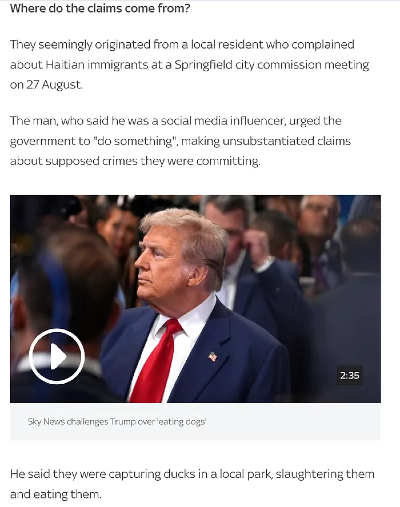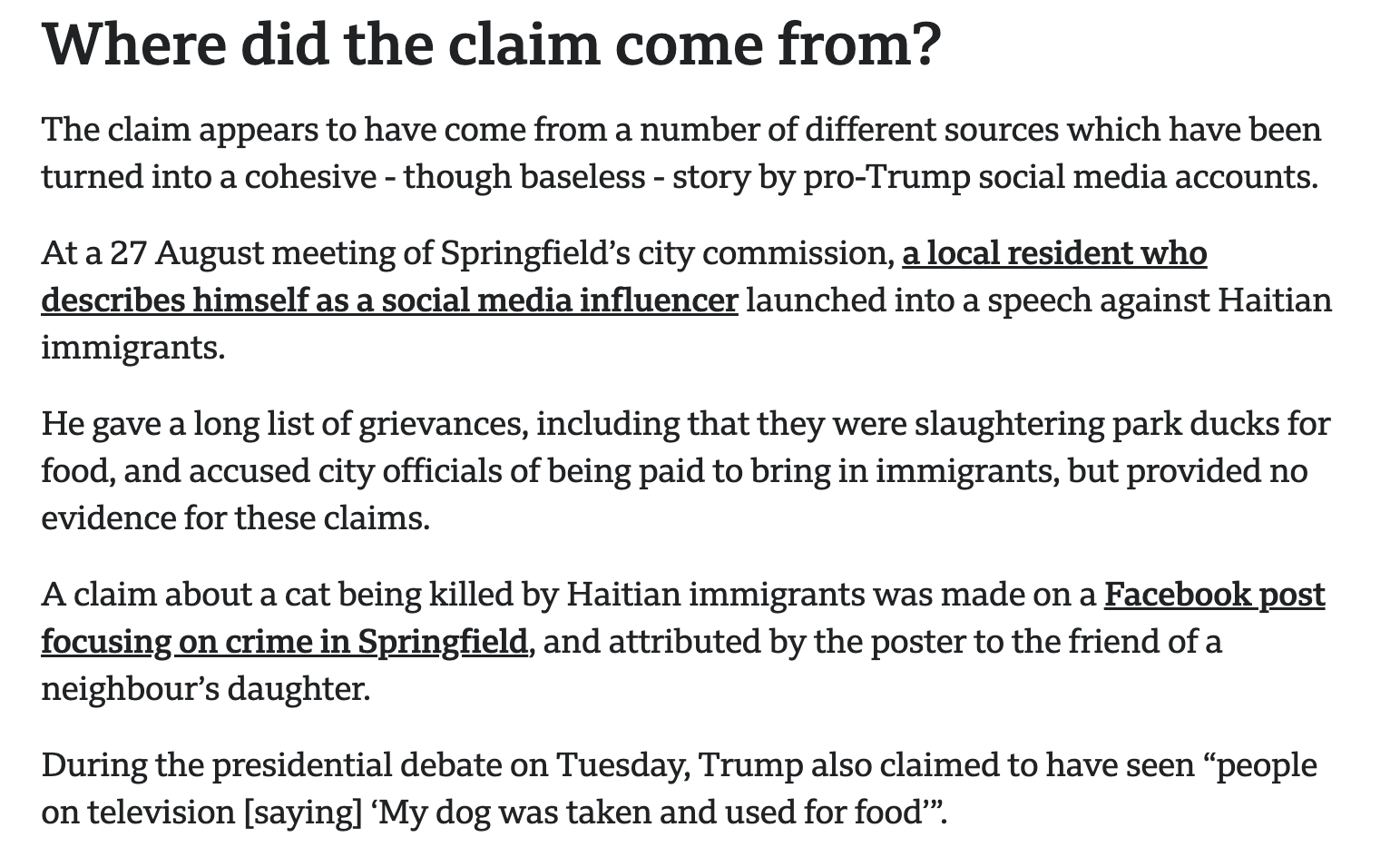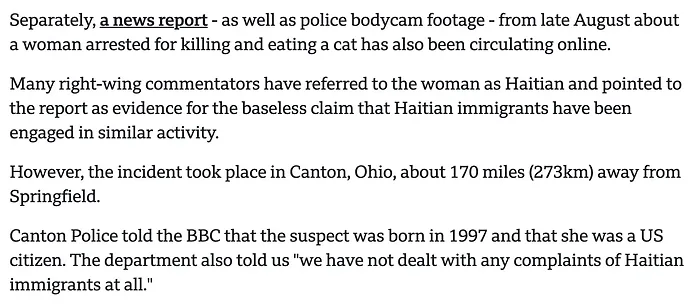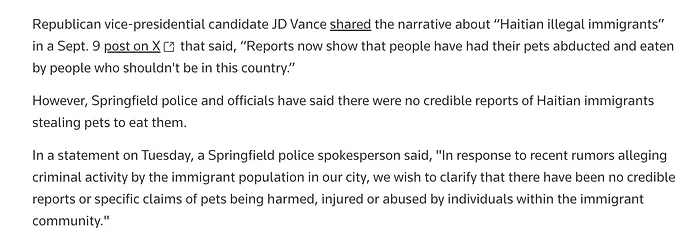Are Haitian Immigrants Really Eating People's Pets?
Context: As a blogging assignment for a class on misinformation and the dissemination of 'fake news', we had to pick a recent claim, explain why it was relevant to the class material, and walk through how we debunk/prove it false using critical thinking and media literacy concepts.
Since it was brought up during the first (and maybe only) Trump v. Harris debate this past week, I will be talking about a claim repeated by former President Trump that I, personally, as a Latin American, have been laughing at in an attempt not to get angry. In an unhinged rant, he said that undocumented Haitian immigrants in Springfield, Ohio, were “...eating the dogs, the people that came in, they're eating the cats… They're eating... they're eating the pets of the people that live there.”
The claim is worth examining because a former president went on a national debate stage during the 90-day push of a presidential election and made inflammatory claims that have since caused havoc in Springfield, leading to bomb threats at two schools and the local facility for the state motor vehicle agency.
So, you, the reader, have just heard a former President go on a tangent about people stealing and eating pets in a town in Ohio. You’re thinking, ‘Surely that can’t be true because if it is… that’s horrible.’ in this blog post, I will show you how to evaluate and fact-check the information in front of you, using a technique called “lateral reading.”
Lateral Reading involves verifying while you’re reading by searching for articles about the same topic but by different authors and publications and seeing if the information lines up. While you’re doing so, take stock of what kind of outlets are reporting in what way. Are they an authority on the issue? Are they using statistics from leading experts? How do they go about checking their information?
So you have your claim; that Haitian immigrants are eating people's pets in Springfield, Ohio. Even though this sounds ridiculous and outlandish from the beginning, let's go about it the way we should any other way. I'd start with a simple Google search; I went a bit vague in order to get a feel for the topic. For example, some search options are,"Haitian immigrants eating pets Springfield Ohio" or "Trump debate claim Springfield Ohio pets".

So what claims are in this story? Let's split it up into smaller sub-questions in order to make fact-checking easier.
- Are there pets being eaten?
- Are there pets being eaten in Springfield, Ohio?
- Are there pets being eaten by Haitian immigrants in Springfield, Ohio?
These questions are not mutually exclusive, but for this claim to be true, all of these must be true. For example, there could be pets being eaten in Springfield Ohio, but does that mean that Haitian immigrants must be behind it? No. All elements are just as important as eachother in evaluating the claim.
I went ahead and opened up 9-10 different articles from sources like the BBC, Sky, CNN, The Guardian, the New York Times, Reuters, AP, and CBS.
The first thing I noticed in all of these article titles, is that they refute Trump's claim in some way, shape or form. "Trump repeats baseless claim about Haitian immigrants eating pets", "Fact Check: No evidence of Haitian immigrants stealing and eating pets in Ohio", "JD Vance spreads debunked claims about Haitian immigrants eating pets", "John Legend, a Springfield, Ohio native, denounces false claims about migrants and pets, asks grace for our "Haitian brothers and sisters"", etc.
This already tells me that the information that Trump was spouting is more than likely false. The headlines are dismissive, and outright contradict the legitimacy of the claims. But lets go a step further. Why is it false, and where did they come from?
Major outlets answer this question in their articles, citing the same reasons; in a late August city commission meeting, a Springfield resident claimed that immigrants were in a local park "...grabbing ducks by their necks, cutting their heads off and walking off with them to "eat them"."This claim was unsubstantiated at the time of the meeting, but nonetheless spread online. Later, a Facebook post in a private group told a story about her "neighbour's daughter's friend", whose cat had been strung up from a tree and slaughtered for food outside a house where Haitian people supposedly lived.
Is some guy's "Neighbour's daughter's friend" an accurate or reliable source of information? No. So is there credible claims of pets being eaten in Springfield, Ohio, at the time of my writing this? No.


For the sake of argument, let's say that there is evidence of someone eating another person's pets. For example, social media users have brought up bodycam footage of an incident in Canton, Ohio where a woman was being arrested for allegedly killing and eating a cat. Should this incident be involved in the conversation? Let's go back to our questions.
- Is there a pet (allegedly) being eaten? ✅
- Are there pets being eaten in Springfield, Ohio? ❌
- This incident happened in Canton, which is over 250km away from Springfield.
- Are there pets being eaten by Haitian immigrants in Springfield, Ohio? ❌
- The suspect was born a U.S. citizen. So not only is she not an immigrant, but also not tied to the Haitian community.


Therefore, this does not count as evidence to support this claim. Remember, all elements must be true in order for this evidence to count towards the claim.
Finally, lets talk about how these articles can be seen as reliable. If they are national or international news sources, how can we be sure they're getting the correct information from the right people to fact check this accurately?
The articles below all use information given to them by locals like Ohio Gov. Mike DeWine and Springfield PD. Both of which are authoritative voices on the ground with access to the information necessary in order to say with certainty if this claim is true or false. As you can see, neither have any evidence of credible reports of Haitian immigrants harming pets.




So, to conclude this claim analysis; we can safely say that this story is FALSE. The consensus among a plethora of major news organisations and local official channels have found nothing to back up these claims!


